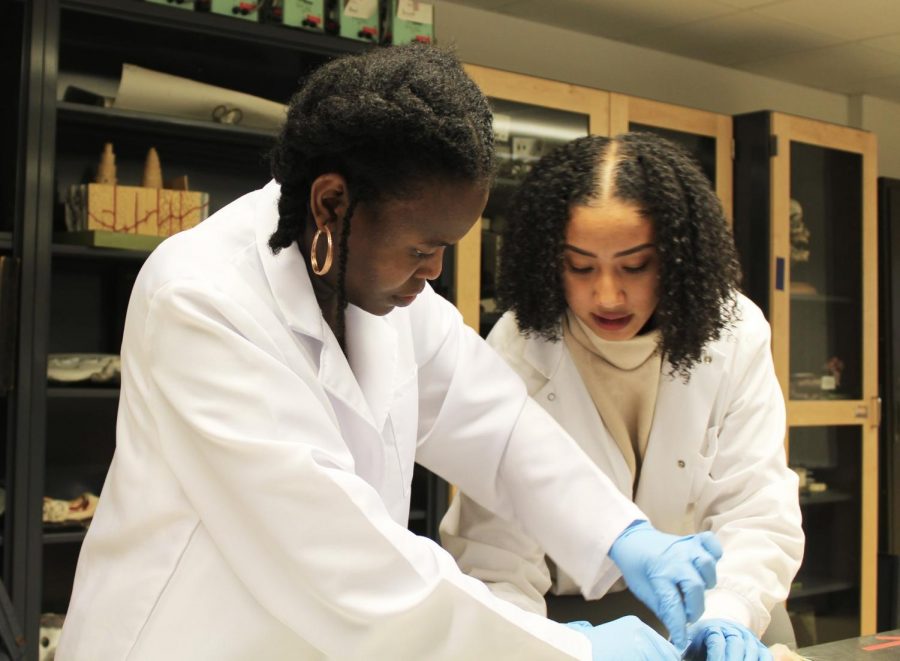Organization MAPS out students’ futures
Glory ‘Tomi’ John and Alexys Wright work in a lab together on Jan.10. The two worked together to start a new chapter of the Minority Association for Pre-Medicine Students at Loyola. Photo credit: Rae Walberg
February 13, 2020
Biology pre-health senior Alexys Wright said that when she was a freshman, she struggled transitioning into the STEM major.
“I remember the first semester, I was like, ‘I’m going to change my major. I’m going to be an English major. This is just too hard, maybe it’s not meant for me,’” Wright said.
According to Wright, however, the shared struggle and support from her roommate, who was from a similar background, contributed to her resilience and founding of Loyola’s Minority Association for Pre-Medicine Students (MAPS) chapter in years to come.
“She really showed me what the importance of having a support system was and having someone who looks like you help you through the process cause medicine is hard,” Wright said.
In Loyola’s chapter, Wright hopes to build a camaraderie between minority students on the pre-medicine track to model the same necessary support she got as a freshman
“There are many times where you might struggle to get up and go to class and you need that extra push,” Wright said. “I think the basic human instinct of, I have someone there to support me and be there with me.”
Glory ‘Tomi’ John, biology pre-medicine senior and Minority Association for Pre-Medicine Students member said she’s confident that the organization will focus on a minority group that hasn’t received much attention at Loyola, especially since she said there is a lack of representation amongst faculty.
“I just hope that this actually brings a positive change among the pre-health students and especially minority students that way they don’t feel left out,” John said.
Wright, who also said she has been affected by underrepresentation, hopes to utilize her position in the organization to influence the hiring of a more representative faculty.
“I would definitely say that representation is truly important and that sometimes it is difficult to really understand that if you are not one of the ones who are misrepresented,” Wright said. “So things like that, bringing awareness to that, and just saying, ‘Hey as Loyola continues to build with its student population, we also grow as professors who look like us and can relate to some of the experiences that not every student comes from the same background.’”
Besides sparking conversation on representation, John said she expects the group to help students prepare for the future in pre-heath.
“We need a lot of help especially preparing for MCAT, preparing for medical school, learning about what time you should be on, what kind of classes you can take, what internships you should be doing, when you should start research. And just having this community where we all are not just talking about events but also like, ‘How can I help you,’” John said.
Starting off with 50 members, Wright has made it her goal to increase membership through working with her advisor, Rosalie Anderson, to identify minority pre-health and advertising across campus.
“I think that’s the ultimate goal, be a support system and collaborate with other organizations and clubs on campus to really promote different health concerns within our population and just keep teaching and growing,” Wright said.
Awaiting the first general assembly meeting on Feb. 20 at 6 p.m., Wright and John encourage interested students to come to their events and meetings and find a community amongst students of a similar background.
“We are there for them and there’s no reason to feel alone as a minority on campus,” John said.









Ellen Byron • Feb 13, 2020 at 11:36 pm
What a wonderful story!! Go, MAPS!!